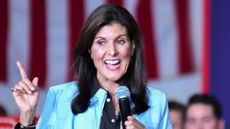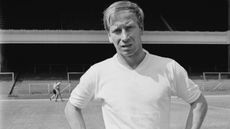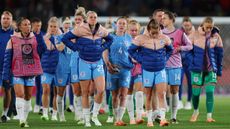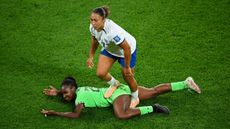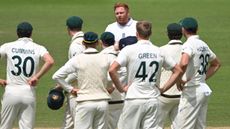Terry Venables: the irrepressible manager with a remarkable footballing brain
'Brilliant man-manager' who gave England fans some of their best moments of recent times
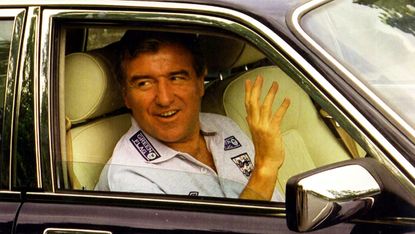
When Terry Venables was appointed Barcelona manager in 1984, one of his first acts was to sell Diego Maradona to Napoli and replace him with Tottenham striker Steve Archibald, said Gary Jacob in The Times. It was a decision that prompted "incredulity" among the club's fans, few of whom gave the 41-year-old Londoner any hope of reviving the "fortunes of the Catalan giant".
Yet Venables soon proved his doubters wrong. That season, Barcelona won their first La Liga for 11 years, with Archibald scoring 19 goals. It ended with "El Tel" – as the British press had dubbed Venables after his move from Queens Park Rangers to the Nou Camp – serenading fans with a rendition of My Way in Catalan. The next year, Venables came agonisingly close to securing Barcelona their first ever European Cup: having reached the final, they lost on penalties to Steaua Bucharest of Romania.
'Brilliant man-manager'
It is hardly surprising that Venables galvanised Barcelona, said Oliver Holt in the Daily Mail: he was one of the finest coaches England has produced. The possessor of a remarkable footballing brain, he would discuss the game for hours on end with journalists, invariably with a "twinkle in his eye": often, he would end up "moving salt and pepper pots around the table to illustrate a tactical point".
Subscribe to The Week
Escape your echo chamber. Get the facts behind the news, plus analysis from multiple perspectives.

Sign up for The Week's Free Newsletters
From our morning news briefing to a weekly Good News Newsletter, get the best of The Week delivered directly to your inbox.
From our morning news briefing to a weekly Good News Newsletter, get the best of The Week delivered directly to your inbox.
But no less crucially, he was a "brilliant man-manager", with a knack for getting the best out of his players. Perhaps the clearest example came during his time as England manager, when he conjured one last "flowering of Paul Gascoigne's genius" at the Euro finals in 1996. Ignoring calls to drop the increasingly wayward 29-year-old, Venables instead made Gascoigne the fulcrum of his team – and was rewarded with a string of mesmerising performances, including "Gazza's bravura individual goal against Scotland at Wembley", and England's astonishing 4-1 demolition of the Netherlands.
'Irrepressible energy'
Venables was born in 1943, in Dagenham, east London, the only child of Royal Navy petty officer Fred Venables and his Welsh wife Myrtle, said Richard Williams in The Guardian. Football-mad from an early age, he represented England schoolboys and was signed by Chelsea aged 15. (Much of his £5-a-week salary "went on his daily bus and train fares from one side of London to the other".) A "clever inside forward", he won the League Cup with Chelsea in 1965 and the 1967 FA Cup with his next club, Tottenham. Later, he played for QPR and Crystal Palace, and it was at the latter that he made the transition to coaching, becoming manager in 1976, 18 months after he had retired as a player.
Venables was a man of such irrepressible energy that football wasn't enough to occupy him, said The Daily Telegraph. While a player, he became involved in various business schemes – one being the marketing of the ill-fated "Thingummywig", a covering for women to wear over their curlers. He wrote a series of detective novels, owned a private members' club in west London, and was a "fine crooner" whose 2002 World Cup song, England Crazy, reached No. 46 in the charts. But his "off-pitch activities" also landed him in trouble. In the 1990s, Venables' business dealings – particularly a brief spell as co-owner of Tottenham with Alan Sugar, while he was also manager – came under increasing scrutiny, and it was doubts over his financial probity that led the FA to decide not to extend his England contract past 1996. In 1998, he accepted 19 charges of serious misconduct, which led to a seven-year ban on being a company director.
'Remembered for the way he made people feel'
Venables never achieved much in football again: spells at Middlesbrough and Leeds were unsuccessful. As critics pointed out, the trophy cabinet at the end of his managerial career "hardly groaned with honours" – his La Liga title with Barcelona being his one significant piece of silverware.
Still, "history has a habit of forgetting things such as win percentages and tabloid roastings and financial infringements", said Jonathan Liew in The Guardian. What Venables will be remembered for is the "way he made people feel". Fans of numerous clubs, and of England, will be forever grateful for the joy he brought them – as will the countless players whose careers he nurtured. Even though he may not have achieved all that his talents deserved, his was undoubtedly a "great English life".

Continue reading for free
We hope you're enjoying The Week's refreshingly open-minded journalism.
Subscribed to The Week? Register your account with the same email as your subscription.
Sign up to our 10 Things You Need to Know Today newsletter
A free daily digest of the biggest news stories of the day - and the best features from our website
-
 The Week Unwrapped: Nikki Haley, leaseholds and the death of funerals
The Week Unwrapped: Nikki Haley, leaseholds and the death of funeralsPodcast Has Donald Trump met his match? Will a new law help homebuyers? And why are funerals falling out of favour?
By The Week Staff Published
-
 Shein: the biggest Wall Street float of 2024?
Shein: the biggest Wall Street float of 2024?Speed Read Clothing industry disruptor is about to test its acceptability on the US stock market
By The Week UK Published
-
 A Neolithic marvel in southeast Turkey
A Neolithic marvel in southeast TurkeyThe Week Recommends A trip to Göbekli Tepe offers visitors the chance to explore nearby Sanlıurfa
By The Week UK Published
-
 Bobby Charlton: England's old-fashioned sporting hero
Bobby Charlton: England's old-fashioned sporting heroObituary Not only was Sir Bobby one of the country's greatest-ever footballers he was lauded for his demeanour on and off the pitch
By The Week UK Published
-
 The staggering talent of Jude Bellingham
The staggering talent of Jude BellinghamWhy everyone's talking about Real Madrid and England midfielder is clearly the 'top dog in town'
By The Week UK Published
-
 Coco Gauff: a tennis prodigy comes of age with US Open win
Coco Gauff: a tennis prodigy comes of age with US Open winAmerican 19-year-old battled back from a set down to claim first grand slam title
By The Week Staff Published
-
 Lionesses will have regrets but their legacy can be ‘incredible’
Lionesses will have regrets but their legacy can be ‘incredible’feature England stars return home after heartbreaking Women’s World Cup final loss to Spain
By Mike Starling Published
-
 How English women’s football could become a billion pound industry
How English women’s football could become a billion pound industryfeature Building on the success of the Lionesses won’t be easy but it is eminently possible
By The Week Staff Published
-
 Lionesses dig deep after Lauren James’s ‘Beckham-esque’ red card
Lionesses dig deep after Lauren James’s ‘Beckham-esque’ red cardfeature England reach the Women’s World Cup quarter-finals after a 4-2 win on penalties against Nigeria
By Mike Starling Published
-
 Adam and Simon Yates become the first twins to top a Tour de France stage
Adam and Simon Yates become the first twins to top a Tour de France stagefeature Good news stories from the past seven days
By The Week Staff Published
-
 The Ashes: can England mount a glorious comeback?
The Ashes: can England mount a glorious comeback?feature ‘Herculean’ task follows ugly scenes at controversial second test
By The Week Staff Published
